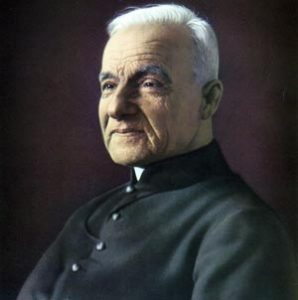EASTER VIGIL – YEAR C
Easter is Not a Spectator Sport
(Romans 6:3-11; Psalm 118; Luke 24:1-12)
*******************************************
Truly, tonight we have feasted on God’s Holy Word. Each year during the Easter vigil we are invited to listen attentively to the same seven readings from the Old Testament. These readings never change, nor does the reading from the New Testament, a reading from Romans, though some may be omitted.
What does change each year is the Gospel, so each vigil of the three-year cycle takes on a different nuance depending on the Gospel and how it relates especially to the reading from Romans.
This year’s Gospel from Luke invites us to be participantsin the Easter drama, not just spectators, so that we might walk in newness of life.
This thought comes from the contrast between the actions of the women who came to the tomb that Easter morning, and Peter who also ran there. We are told that Peter stooped, looked in and was amazed.
 The women, to the contrary, were on a mission of love. They wanted to anoint the body of Jesus so that he would have a proper burial and that is why they entered the tomb. They went right into the tomb where they encountered two angels who spoke to them, reminded them of the words of Jesus, and told them that he was risen from the dead. They then remembered the words of Jesus, and went back to tell the eleven and the others this great good news. They went beyond amazement to belief right away and became the first witnesses to the resurrection, the first evangelists.
The women, to the contrary, were on a mission of love. They wanted to anoint the body of Jesus so that he would have a proper burial and that is why they entered the tomb. They went right into the tomb where they encountered two angels who spoke to them, reminded them of the words of Jesus, and told them that he was risen from the dead. They then remembered the words of Jesus, and went back to tell the eleven and the others this great good news. They went beyond amazement to belief right away and became the first witnesses to the resurrection, the first evangelists.
This vigil began with the creation account from Genesis. The phrase that begins the Gospel, on the first day of the week, at early dawn, is a signal that this is all about a new creation, a new world order, a new way of life, a new reality that only those who believe and who act on that belief will experience.
St. Paul, in the reading from Romans, explains how this new creation will take place. He reminds us emphatically that in baptism we have been buried with Christ and have died to sin. In our baptism we have also risen with Christ to a new life, a new creation, a life doing our best not to sin.
To experience this new life of Easter, then, we must not only be baptized, but also live out our baptism. We do that by putting our faith in Jesus and following him through our own passion, death and resurrection.
We, like the women and unlike Peter, must go beyond looking in and amazement, to experiencing the power of the resurrection. We must go right into our own tombs if we are to experience the new creation that Jesus brought about by his resurrection.
Our passion is the process of entering the tombs of our own making, our own sin and sinfulness. We are to make an inner journey of contrition for our sins, naming them and confessing them and receiving the forgiveness of the Risen Lord for them.
Then we are to acknowledge and name our sinfulness, those painful emotions and negative attitudes, those defects of character and shortcomings that made us sin in the first place, and receive healing from them, allowing the love of Christ to heal us by replacing them with the gifts of his Spirit.
Like the linen cloths that stayed behind in the tomb when Jesus rose from the dead, these defects of character, whatever they are (false pride, stubborn self-will, tendency to control, resentment, selfishness, an addiction, etc.) – these too are meant to stay in the tomb as we emerge to a new life with Christ. Truly, Easter is not a spectator sport – it is experienced only by those who participate in the Paschal Mystery with faith and trust.
May I suggest four critical signs that we have experienced the new life of Easter by living out our baptism and participating in the Paschal Mystery?
One sign will certainly be the ability to forgivethose who have hurt us in any way. On the cross, Jesus was forgiving those who tortured and were killing him, and so must we. In the upper room after his resurrection, he forgave the disciples who denied and abandoned him and breathed on them the Spirit of forgiveness. Forgiveness is a sure sign of the new life of Easter.
A second is the ability to love, to receive love from others and to give love to others, to trust others with who we are, to listen to their inner reality, to achieve intimacy with others as Jesus did with John, to show affection and to receive affection from others.
A third sign is freedom from addiction, from compulsive behaviours. Jesus came to set us free, to help us have only one God in our lives, to turn us away from attachment to false gods, from those addictions that will only entrap and destroy us.
A fourth sign is a life of selfless service. When we let of our egoism and self-centeredness and seek only the good of others and work for the common good, then we most certainly have experienced the new life of Easter by participating in the Paschal Mystery. We are walking in newness of life, as St. Paul puts it.

St André Bessette
Blessed André Bessette of Montreal, who was canonized some years ago, is an example of someone who truly lived this message of Easter. A humble porter in his religious community, his tremendous love for Jesus expressed by his devotion to St. Joseph gave him a unique power to heal others. He spent his life praying for all who came to him, sharing with them the Good News of Jesus Christ risen from the dead, and healing many. Such was the strength of his love that he was instrumental in building the magnificent Oratory of St. Joseph that reigns over the city of Montreal.
The Eucharist we celebrate tonight is our liturgical participation in the Paschal Mystery, a living out of our own baptism, an experience of descending into our own tomb and rising, forgiven and healed, to a new life in Christ.
So, as we celebrate together this great Easter vigil, let us remember that Easter is not a spectator sport. Easter is an active participation in the Paschal Mystery living out baptism every day, dying to sin and rising with Christ to the newness of life that he alone can give us.




We are to experience the Paschal Mystery by renewing our baptism and experience Jesus as a risen Lord so we can have forgiveness and be fully healed to as a true Christian. To have forgiveness and love is when he dies on the cross and his resurrection helps to realize what is forgiveness ; how to God forgive us for our sins so we do not suffer in eternal life. It is God or Jesus who can perform this miracle to us . We should give thanks to God by offering this Passover meal or lamb as way to celebrate his life. Jesus is with us once we receive this communion or the Eucharist so we can feel his love while he is risen. Jesus will always be present through the Spirit if we are fully healed and allow him to enter in our lives. It is a blessing. Amen . Rejoice!
Thanks Bishop Sylvain Lavoie . Happy Easter! Many Blessings!